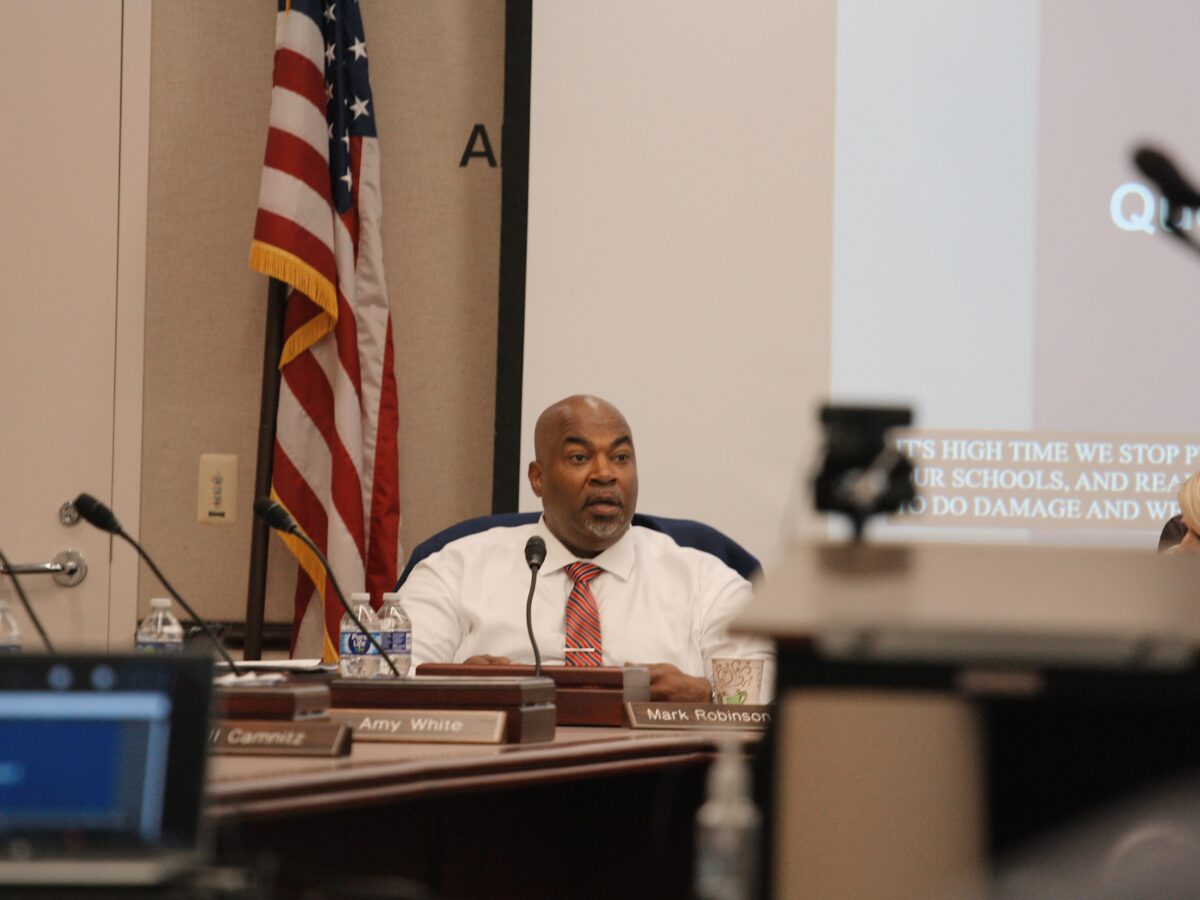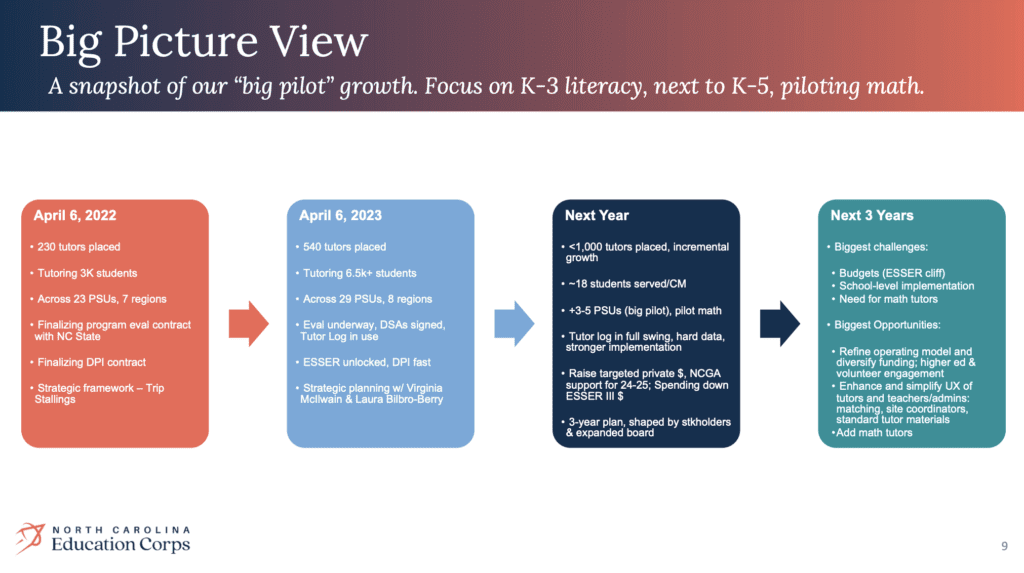

Share this story
- On Wednesday, Vice Chairman Alan Duncan said gun violence has become the leading cause of death for children and teenagers. He encouraged board members during their work session "to stop and reflect, meditate and pray for solutions.”
- At the State Board of Education's April meeting, members discussed school safety, literacy, education prep programs, free school lunches, and more. Read our recap of the meeting here.
|
|
State Board of Education members discussed the urgency of increasing school safety in response to gun violence at their April meeting this week, with members suggesting a variety of solutions.
There were 51 school shootings with injuries or deaths last year, according to Education Week’s school shooting tracker. Those shootings resulted in 100 injuries and 40 deaths. According to Education Week, there have been 13 school shootings so far this year.
While school shootings remain statistically rare, EdNC previously reported that many districts in North Carolina started reviewing safety procedures and working with local law enforcement to address school safety last fall.
On Wednesday, Vice Chair Alan Duncan said gun violence has become the leading cause of death for children and teenagers. He encouraged Board members during their work session “to stop and reflect, meditate and pray for solutions.”
“We spend inordinate amounts of money, as we should, to protect children from diseases as they grow up,” Duncan said. “We should have the same level of diligence, attention, concern, and thoughtfulness about protecting our children from this plague that now has harmed so many students and others.”
You can read this September 2022 EdNC article to learn about existing school safety practices and best practices as evidenced by research and school safety experts. Those best practices include proactive interventions, school mental health services, and social and emotional learning, EdNC reported.
At Thursday’s regular meeting, several other Board members expressed concerns. Their discussion took place after students across the state held walkouts to protest gun violence in schools on Wednesday and Thursday, as part of a national school walkout.
Last week, a high school student brought a gun to Forsyth Technical Community College and shot themself in the hand.
State Superintendent Catherine Truitt said survey data shows that parents’ biggest concern is consistently school safety.
Board member Leah Carper, the 2022 N.C. Teacher of the Year, said it is on the forefront of teachers’ minds, too.
“What are we doing to make sure that our kids are safe?” Carper said. “I would advocate that we need human beings, we need people, whose only job is to protect our children – it shouldn’t be on our teachers.”
The threat of gun violence is one of many things contributing to teachers leaving the profession, Carper added. She shared accounts of many conversations with other teachers about their fear of school shootings.
“That is certainly not just startling, but hard to hear,” Truitt said in response.
More than $70 million in school safety grants have been given to schools, Truitt said. She added that not all schools use the money for the same measures, mentioning school resource officers (SROs) as an example.
“Districts have the ability to choose how they use those dollars, and not all districts choose to employ people who will protect in the way you just described,” Truitt said.
She encouraged people to contact their local boards of education and superintendents about how the safety dollars were spent in their communities.
During her superintendent report, Truitt also highlighted the 10th anniversary of the Center for Safer Schools and some of the center’s work. She specifically mentioned mental health first aid and EKG2, a training curriculum for seventh graders that teaches “about the legal, medical, and emotional consequences of youth gun possession, substance abuse and related gun violence.”
Lt. Gov. Mark Robinson, a large proponent of gun rights in the state, said school safety should not be a political issue. Robinson suggested building better security systems in and around schools.
“Every time people bring up this issue the very first thing people say is, ‘Do you know how much money this is going to cost?'” Robinson said. “I don’t see a dollar sign on my kids’ life. I don’t. And it’s high time we stop putting everything in front of this and start taking a look at our schools and realize they are soft targets for madmen and women who want to do damage. We need to protect our kids.”
Duncan suggested scheduling a future issues presentation on school safety to learn more about the complexities of gun violence, and how schools are addressing it.
Marcela Villasuso Venegas, the Board’s high school senior student advisor, reminded Board members how normalized it has become for students across the country to deeply worry about school shootings.
“It should be their safe place,” she said. “And it’s not.”
Educator prep programs
The Board offered initial approval to Blue Ridge and Wayne community colleges to offer the Elementary Education Residency Licensure Certificate Program, effective fall 2023. The State Board of Community Colleges approved those programs in January.
Members also discussed additional colleges seeking approval to be voted on at a future meeting: Alamance, Central Piedmont, Fayetteville Technical, McDowell Technical, and Western Piedmont community colleges. The State Board of Community Colleges approved those five colleges to offer education prep programs in February.
Those new programs makes teacher licensing more affordable and convenient with classes at local community colleges, according to a February release from the N.C. Community College System (NCCCS). The NCCCS framework outlining such programs was approved by the State Board of Education last June. Historically, the vast majority of N.C. teachers come from the UNC System.
Dr. Olivia Holmes Oxendine, chair of the State Board of Education’s educator standards and practice committee, said she expects to see additional community college approvals in the next few months.
“North Carolina community colleges are making it easier and more affordable to become an elementary school teacher in your community,” NCCCS Interim President Dr. Bill Carver said in February. “We are committed to supporting the needs of the state through education programs that quickly and appropriately prepare graduates for vital classroom responsibilities.”
Teacher supplements, charter schools, proposed legislation, and more
In fiscal year 2021-22, $100 million was appropriated for salary supplements to teachers and instructional support in eligible public school units.
On Thursday, the Board discussed a report it must give to the General Assembly on these supplemental funds.
A 2021 state law requires the Board to report the list of eligible counties and local school units, funds allocated to each, and the effect of the salary supplements on teacher retention, among other things.
“With the short period of time since the distribution of the funds, as well as the numerous bonus programs that were included in the Appropriation Bill, it is not possible to isolate the impact of the additional supplements on retention,” the report says.
You can view that draft report here.
Jamey Falkenbury, the Department of Public Instruction’s (DPI) director of government affairs, also updated Board members on proposed education bills.
Among many bills, Falkenbury highlighted the following legislation:
- H142: Protect Our Students Act.-AB. This bill updates penalties and definitions for certain sex offenses against a student, and increases penalties for failing to report misconduct toward children, among other things.
- H149: Remote Charter Academies. Authorizes charter schools to provide remote instruction to students and required the State Board to approve a minimum of two statewide remote charter academies. The bill also authorizes a one-year extension to the expiring virtual charter school pilot despite its low performance. On Tuesday, lawmakers also added an amendment to this bill on confirmation of the NCCCS president.
- HB382: Registered Nurses in Schools. The bill, filed last week, would expand the pool of nurses able to work in public schools with an aim to alleviate personnel shortages.
- H432: Principal Licensure Changes. Among other things, the bill grants the State Board “entire control” of the licensing of applicants.
- S187: Teacher Licensure/Retired Educator Program. Essentially, this bill would make limited licenses renewable without having to pass a test.
- S193: Career Development Plans. Under this bill, middle school students must complete a career development plan in seventh grade. High school students will resist their plan in 10th grade.
- SB406: Choose Your School, Choose Your Future. The bill, if enacted, would be the “largest expansion of school choice” since the state enacted the Opportunity Scholarship program 10 years ago. You can read more on that bill here.
You can view the full presentation here. You can also read EdNC’s education bill tracker here.
Falkenbury also addressed a special provision in the House budget that would make the North Carolina Charter School Review Board (CSRB) the initial authorizer of charter schools. Under that provision, the State Board of Education would establish rules for the operation and approval of charter schools, but the CSRB must approve such rules first.
The State Board of Education currently oversees N.C. charter schools.
Student learning and achievement
The Board reviewed new mid-year DPI data showing that more K-3 students are on track when it comes to gaining literacy skills, during the first full year of implementation of the Excellent Public Schools Act of 2021.
North Carolina K-3 students showed growth in literacy skills from the beginning to the middle of this academic year, the data show – at faster rates than the national sample.
“On top of all the other hard work that teachers do in their classrooms every day, they’ve been spending many hours outside the classroom learning to retool their instructional practices,” Truitt said in a DPI release. “They’re to be commended, as their work has helped improve literacy proficiency and outcomes for students across the state.”
You can read more about that data here.
The board also received the 2023 report from the State Advisory Council on Indian Education (SACIE). The council analyzes the academic performance of American Indian students in North Carolina’s public schools outlining major findings and recommendations to the State Board of Education, as mandated by the General Assembly.
While improvements are being made, the council said opportunity gaps for American Indian students still exist. You can view the council’s full presentation here.
On Thursday, the meeting issues session included an update on the North Carolina Education Corps, which was launched by the Board and office of the governor during the heart of the pandemic.
N.C. Education Corps is working with 29 public school units across the state, where the organization placed 540 tutors this year. Those tutors work in person with students during the school day, three times per week.
Mike Ward, the chair of the bipartisan board of directors, said the organization’s tutoring largely focuses on literacy. He celebrated the mid-year literacy data shared with the Board on Wednesday.
“We’re delighted that we get to be your partner in that incredible mission,” said Ward, who formerly served as the state superintendent of public instruction.
N.C. Education Corps Executive Director John-Paul Smith highlighted the organization’s emphasis on quality, scalability, and sustainability – particularly as Covid-relief funds run out.
“We know that there are a lot of students across the state who can benefit from high-dosage tutors. We are just beginning to scratch the surface of rising to the level of student need,” Smith said. “So we are thinking about how we can continue to refine our model to increase the number of students served, (and) make sure they’re receiving quality support.”


Free school lunches and water testing
Near the end of Thursday’s meeting, Carper read an essay she wrote about the importance of providing free lunch to all students. The piece was published by the Greensboro News & Record last month.
“Think about all the students who, right now, are sitting in North Carolina classrooms hungry for change, and ask yourself if you can be a rescuer,” Carper read to Board members. “After all, one of those students might become a North Carolina Teacher of the Year.”
A pandemic-era federal program provided free school meals to all public school students for about two years, but that program ended in September.
Last month, the U.S. Department of Agriculture (USDA) announced a new plan to expand access to school meal programs for students across the country. That proposed change would provide school meals to students at no cost by expanding the number of schools that are eligible for the Community Eligibility Provision (CEP).
Carper’s piece urged lawmakers to include “no-cost school meals for all in the state budget regardless of a student’s background.” Lt. Gov. Robinson and Superintendent Truitt expressed agreement.
“(It’s) something that shouldn’t be controversial, but it is,” Truitt said. “So I would just say to my fellow conservatives, that the issue of free meals for all, in the end, ends up helping the working poor more than any other group. For that reason, I am just philosophically and personally in favor of free meals for all.”
North Carolina students have already racked up more than $3 million in school meal debt this school year. The state House budget proposal would allocate $7 million to pay off school meal debt.
The board also heard about Clean Classrooms for Carolina Kids, an expansion for Clean Water for Carolina Kids Program. Under that program, N.C. schools will be tested to remove dangerous levels of lead and asbestos. The state is using $150 million of federal funding to test the lead levels in water, lead-based paint, and asbestos in schools and child care facilities.
The program will also provide abatement funding for impacted sites across North Carolina, from spring 2023 through 2026.
The State Board of Education meets next May 2-4 for its planning and work session.






